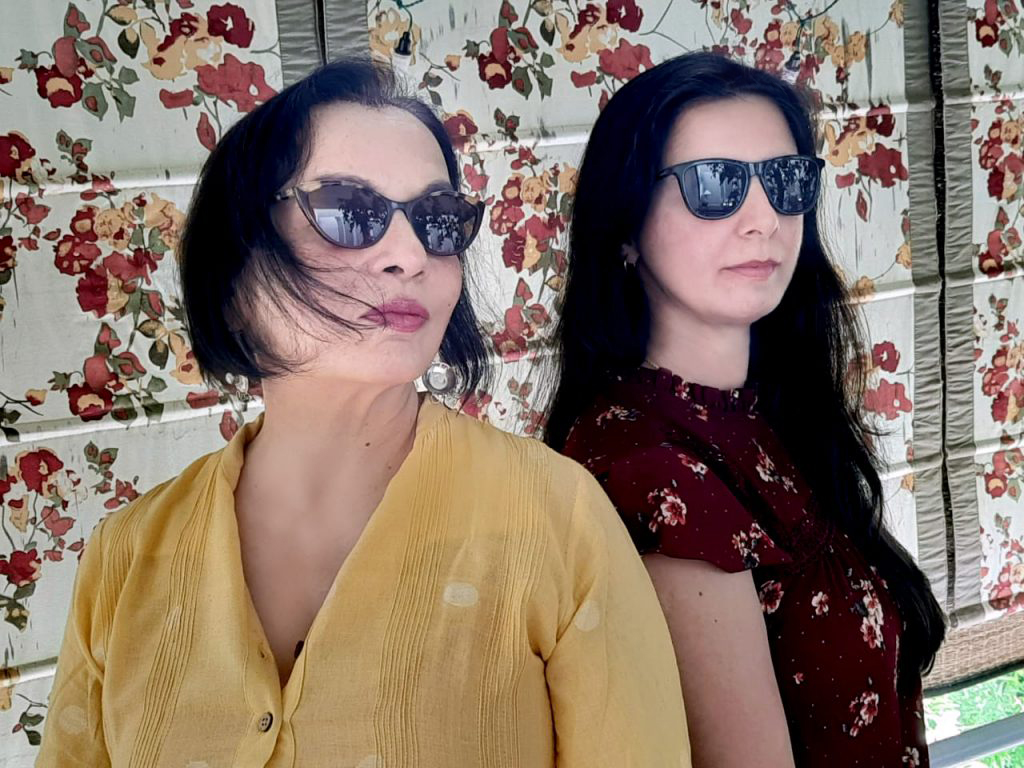Volume XI | Issue 2

We announce with regret that the current June 2023 issue of Poetry at Sangam will be the journal’s last issue.
We are deeply grateful to the guest editors, poets and translators who contributed to the journal during its decade-long existence, and of course to our readers. We also sincerely thank the institutions, individuals and webmasters who sustained its existence.
We are proud of the contribution we have made to the literary community–which will continue as Poetry at Sangam will remain as an archive on the exceptional international writers’ residency Sangam House’s website that has hosted us these ten years.
–-Priya Sarukkai Chabria and Mrinalini Harchandrai
The focus of this issue is translation. We also carry poems from the greatly respected writer Keki N. Daruwalla’s recent collection, Landfall, in a special section curated by Anjali Purohit.
Assamese
Assam’s riverine culture and ecosphere flow through the poems Anindita Kar has chosen to translate, carving out in words geographical, emotional and spiritual spaces that come burningly alive on the page. One senses the translator’s thrall. Nilima Thakuria Haque’s beautiful and passionate poems brim with pain and empathy for her fellow citizens. Anger too floods against societal hypocrisies. Besides ecopoetics, love and splendor swim through Sarifa Khatoon Chowdhury’s richly imaginative and reflective poems.
Dibyajyoti Sarma is a poet, translator and publisher of one of India’s most respected indie presses, Red River, known for its commitment and courage in swimming against market norms. He translates Lutfa Hanum Salima Begum, possibly the most widely read among Assamese women poets. Her voice is lyrical but her vision is stark, even dark. This sets up whirlpools of internal contradictions. Dibyajyoti seamlessly captures the suspense in her narratives that swim like fish just below the poem’s surface. When the words catch your eye, watch the scales spark.
In spite of some focus on the poetry and flood prone ecology of the Char Chapori region of Brahmaputra’s banks and islands not enough is heard, as if the poets’ voices, especially of women, are also in danger of being washed away like the land that is their home. Shalim M. Hussain, poet, translator and documentary filmmaker searched within his community’s contemporary voices to present powerful poems by Heena al-Haya and Begum Asma Khatun that are like molten stones flung in protest. They hurt both speaker and listener. In his translations, Hussain preserves the poems’ spoken word aspect, and the lament, fury, beauty and sardonic wit springing from their voices, as if from riverine energies and history’s glancing gaze.
Chinese
Many readers will be familiar with the poems of the Chinese Master poets who wrote about exile and friendships, horses neighing and river journeys, grandchildren and lychee trees, drinking, war and death. We have also read moving poems by men on abandoned concubines, moonlight tousling the bed curtains, weeds growing from cracks in the polished floors, phoenix hairpins broken… However the work of women poets seems harder to come by.
With passion and precision, erudition and insight Professor Lu Min initiates a correction to this imbalance. She presents the work of five extraordinary Chinese women poets whose voices ripple down the centuries, from the Song Dynasty to contemporary China: Li Qingzhao, Huang E, Bing Xin, Shu Ting and Yu Xiuhua. Besides providing brief biographies for each embedded in historical context, she gifts us a trajectory of the changing tone through the times. These poets’ voices are cascades of love, the body and female desire, and significantly, of what can be said, and how. Further, Lu Min highlights the forms these women composed in, from the tuneful Ci to the lyrical Bing Xin Style to Yu Xiuhua’s punchy lines. We hear four distinctive voices in Liu Yuanhao’s perceptive and nuanced translations. She brilliantly crafts alliterations to reflect Li Qingzhao’s deployment of sounds in the original and changes the tautness of line and expression to powerful effect for each poet, down to the contemporary poetics of Yu Xiuhua. Zhu Tianyue eloquently translates the lesser known but courageous poet Huang E’s stark desire in lines of echoing loneliness.
Dogri
Filmmaker Amit Dutta’s Backyard Poems written during the pandemic, reflect the opposing pulls of caged body and roaring thought. Minute observations sieved during walks in his backyard introduce us to the busy routine life around him–-of visiting birds, trailing snails, even rain; they recall the haiku’s intense gaze. The spirit, however, refuses spatial boundaries, restlessly leaping over the walls as it were, into inquiries of time and creativity itself. Bilingual writer and animator Ayswarya S Dutta’s keen ear roots these poems in language that’s conversational yet careful, presenting the moment at the pace at which the heart beats. She adroitly takes linguistic leaps to connect inner and outer worlds. These translations remind one of seeing through a floating soap bubble that enlarges the view: tender, magical and ephemeral.
Kashmiri
Neerja Mattoo’s book of translations, The Mystic and The Lyric sits on my bookshelf as a well-thumbed copy. When I heard she was translating contemporary Kashmiri women poets I was keen on sharing these here. She graciously sent a selection of Naseem Shafai’s poems that boldly unroll through vast landscapes of love and loss. Sometimes this love is a savage longing that hisses in the ear and mind when passion floods body and spirit. But, equally, it can allude to the call of Kashmiriyat, the centuries-old indigenous tradition of communal harmony and religious syncretism in the Kashmir Valley characterized by pride for their mountainous homeland. The body of the land, its suffering, neglect and ravage in recent times flows under these remarkable poems of mourning, discovery and freedom. Working closely with Neerja, I, Priya, attempted to unearth with her the multiplicity of meanings inherent in Naseem’s poems that combine the tapestry of the past with the ardour of the present.
Marathi
Rousing and popular bhakti or devotional songs usually combined social protest with an intimate call to surrender to divine will. This pushes against boundaries of caste, class and identity. Often composed in dialects, bhakti songs were frequently added to by later singers in the name of the original mystics underlining, as it were, the vastness of the spiritual. I understood the power of these songs one rainy morning while queuing to enter Vitthal’s temple in Pandarpur: the throng of farmers spontaneously erupted into Sant Tukaram’s abhangs while in the distance the Chandrabhaga river flowed, swollen with mud and monsoon water. Artist, poet and cultural curator Anjali Purohit has presented Eknath’s bajani bharoods that reflect his themes of samaja prabodhana (social enlightenment). Her use of repetition, refrain and incorporation of the original Marathi infuse these poems with a rare melodious lilt. In her fungal translations of Kanhopatra, Anjali weaves her own voice and concerns into that of the original, after the living tradition mentioned earlier. Abhangs (‘a’ meaning without, and ‘bhang’ interruption) are resonant as an ektara’s single plucked string, the musical instrument of choice of these wandering mystics. Anjali’s translations run like glinting water and, like the ektara’s drone, return the mind to the washed space of sanctity.
Náhuatl and Spanish
Poetry at Sangam has gifted me consanguinity through the pulsed blood of poetry, connections across space into the places of the heart, and communion. I first knew poet and translator Autumn Richardson as co-editor with her husband, poet and musician Richard Skelton, of the exceptional journal on ecopoetics and esoteric literature Reliquiae published by their indie Corbel Stone Press. I began collecting these editions. Then I was contributor to their imprint as she was to Poetry at Sangam. I couldn’t bring myself to close our journal without a contribution from her, and asked from Autumn a near impossibility: two poems each of which are in two languages–that are translated into a third. And here they are: Martín Tonalmeyotl’s poems from the Nahuatl, self-translated into Spanish which are translated by Autumn and published in the final issue of Reliquiae that has avatared online here. Serendipitously, this tripartite process echoes the passage of poetry in translation: from writer to its reincarnation by the translator to its rebirth in the reader’s mind. The poems shimmer in the omnitemporal horizon of the sacred that can be stirred by one’s stretched fingertips.
Tamil
Vivek Narayanan presents translations that are generative, and occasionally, close to a riddle from cen / classical Tamil’s ancient and legendary anthology of short poems, Kuruntokai. By choosing this path he remains creatively resonant with the original cankam / Sangam poetics, bringing into play the brilliant allusiveness of these poems on love and poetry itself. Intrinsic to this literary imagination are embedded eraichi / implied signifiers and ullurai / parallel or hidden meaning that, when leapt into, startle with their sensuous and detailed beauty. These poems in Vivek’s translations are flowers of water. As water ripples outwards when stepped in, as a koel’s song calls to another’s, these translations multiply in the readers’ mind, overlaying their internal connections and extending into other poems as well, for the Kuruntokai has a long reach in Tamil literature, and recently, with experimental poets worldwide.
Manikkavacagar’s songs are reputed to make even the stoniest heart melt in sacred rapture; his name means ‘whose words are rubies’. The 8 CE Tamil mystic’s songs are considered the epitome of Southern Saiva bhakti and comprise the eighth book (1000+ songs) of the Thirumurai, which is regarded by believers to be on par with the Sanskrit Vedas. Today, thirteen centuries later, his words, composed in cen /Classical Tamil live on in the hearts and tongues of devotees in temples and homes. Wonder, beauty and superb poetry arising from his absorption in divine grace drew Shobhana Kumar and myself to translating his songs. As always, with mystical verses, hidden meanings throb into the minds of immersive readers; we two translators who have recently begun collaborating each use separate, intuited strategies to suggest these possibilities. Shobhana had independently begun to study Sangam poetics and was already parsing Manikkavacakar’s dense and demanding Thiruvasakam when I invited her collaboration on work I had begun in 2016. Her limpid and exquisite translations vibrate with that rare quality, shimmering devotion, which make them leap off the page into one’s consciousness, at once tender, alive and timeless. You, dear reader, decide if my translations sing to you.
–-Priya Sarukkai Chabria
Hindi
The scopic references in Sudhir Ranjan Singh’s Mokshadhara are of mythic proportion–-from Vikram-Betaal to Dante’s Inferno. Tuhin Bhowal’s challenge is determining how specific the allusions might be, and juggling between the density of prose versus the airiness of shorter enjambed lines. There are also poems that highlight specific words by the usage of space. He navigates these tricky and structured ‘spaced poems’ by altering word order from the original but retaining the plurality of meanings with word choices. Sudhir’s cosmology can be viewed through the transparent bottling that Tuhin employs to maintain the domestic sensibility of the poems. However, the ideas of belief, hope, loss–-all these transcend cultural specificity on the banks of the river Phalgu and are made borderless.
Odia
If there is any doubt as to the power that words wield, the poetry of Hemanta Dalpati consumes it in its fire. Just the name of his poetry collection–-Tirare Lekhilu Naa Tamara–-literally means ‘writing your name on our arrow’. He looses his poem-arrows against casteist, gender and capitalist injustices bred into society through the ages. Translator Pitambar Naik doesn’t flinch from the anger, the irony and the vulnerability in these haunting poems, instead detailing the many silences sweeping the land, and giving names to its faceless adivasi inhabitants in his cupped hands.
–-Mrinalini Harchandrai
ISSUE SPECIAL
To Think the Universe was Moved by Love
Landfall*, Keki N. Daruwalla’s latest book of poems merits reading and then several re-reads so one may mine the many riches that it holds. The vast canvas that these hundred and twenty pages cover is a testament to the exquisite finesse with which Keki can deliver his words, his unchallenged mastery over the craft, his incisive perception of our world and his ability to convey this deeply felt understanding through his verse. The wide sweep of this set of poems begins its travel from the rain-soaked Western ghats, through Ladakh, Cyprus and Salamis, across Alaska to achieve landfall at Canto X, thereafter, again returning to bear witness to the Black Death as also plagues of a different sort that afflict us even today. Keki’s poems are soft, delicate, sensitive, often melancholy, layered with an underlying irreverent wry wit, yet unsparingly razor sharp and searing when they need to make a comment on the tyrannies of our times.
Keki’s poems hold a deep empathy for nature, animals and people that live in harmony with nature. He speaks to the falcon and bald eagle, lynx and beaver, caribou, wolf, bear, squirrel, barbet and marmot as they align themselves to the freeze and thaw of the tundra.
He walks with the mother bear as she hauls her cubs over ice and icy water across a river ‘…which has gentled/ and flattened itself for the salmon to spawn…’ until she finds the salmon waters where she ‘…jumps/on scuttling salmon and scurrying brook,/crashes with her paws till she nabs the fish/and tears half of it off and throws it to her young.’
In his poem On the Blue Jay God, where he speaks about a book on forest dwellers that he had begun fifty years ago but abandoned, he takes an imaginary trip to these forests where he finds ‘…their curiosity about my fountain pen amusing:/’Words should be spoken, isn’t it,/why write them?’. ‘The whole thing would have been a breeze,’ he continues, ‘…writing those pages which memory misplaced./ Time is unforgiving./Why did I abandon the novel/about people who had lived with dusk/but had never seen a streetlight?’
In Keki’s poems, the shepherds being driven out of Agamemnon’s tomb on the mountains by the men in suits wonder, ‘…‘Why does he need such a tall/building to live in death?’ The suits only shout ‘Out!’ and the shepherds must move!
The book concludes with a brilliant set of poems, The Night Attendant that was written in the Covid years during which Keki himself was infected with the virus.
In the last poem quoted hereunder, Keki says, ‘No large words, please, am done with them…’. So, without adding even more words, click here for seven poems from Landfall.
–-Anjali Purohit
*Landfall, Keki N. Daruwalla, Speaking Tiger, 2023
Once again, our gratitude to each one of you. It’s been an unplanned literary adventure, and a wonderful one. Our hearts are brimming.
As always, wishing you a great read!
–-Priya Sarukkai Chabria and Mrinalini Harchandrai

Photo by Suresh Chabria
Founding Editor: Priya Sarukkai Chabria
Deputy Editor: Mrinalini Harchandrai
Poetry at Sangam is supported by art and cultural organisation Raza Foundation
